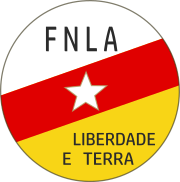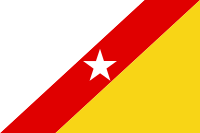National Liberation Front of Angola Frente Nacional de Libertação de Angola | |
|---|---|
 | |
| Abbreviation | FNLA |
| President | Ngola Kabangu |
| Founder | Holden Roberto |
| Founded | 1954 (as the União dos Povos do Norte de Angola guerrilla movement) 1959 (as the União dos Povos de Angola guerrilla movement) 1961 (as the FNLA guerrilla movement) 1992 (as a party) |
| Headquarters | Luanda, Republic of Angola |
| Youth wing | Youth of the National Liberation Front of Angola (JFLNA) |
| Women's wing | Angolan Women's Association (AMA) |
| Armed wing | National Liberation Army of Angola (ELNA) (until 1978) |
| Ideology | Civic nationalism[1] Christian democracy[1] Conservatism[2] |
| Political position | Centre-right |
| Seats in the National Assembly | 2 / 220 |
| Party flag | |
 | |
 |
|---|
The National Front for the Liberation of Angola (Portuguese: Frente Nacional de Libertação de Angola; abbreviated FNLA) is a political party and former militant organisation that fought for Angolan independence from Portugal in the war of independence, under the leadership of Holden Roberto.
Founded in 1954 as the União dos Povos do Norte de Angola guerrilla movement, it was known after 1959 as the União dos Povos de Angola (UPA) guerrilla movement, and from 1961 as the FNLA guerrilla movement.
Ahead of the first multiparty elections in 1992, the FNLA was reorganized as a political party. The FNLA received 2.4% of the votes and had five Members of Parliament elected. In the 2008 parliamentary election, the FNLA received 1.11% of the vote, winning three out of 220 seats.[3]
- ^ a b Projet de Societé Archived 2010-08-05 at the Wayback Machine, official FNLA website (French and Portuguese)
- ^ Consulado Geral de Angola Archived 2013-11-03 at the Wayback Machine
- ^ National Electoral Commission website (in Portuguese).